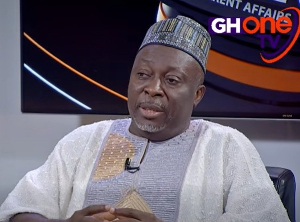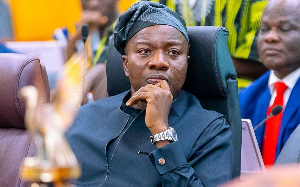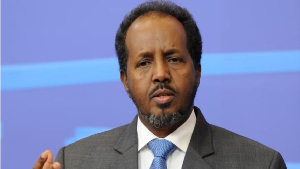By Dr. Michael J.K. Bokor
Sunday, February 26, 2012
Despite our claims that our constitutional democratic system of governance is working well, certain happenings point to the contrary. All is not well and it is just a matter of time for us to have the rude awakening.
That we haven’t had any destabilizing event such as a coup d’état since we adopted constitutional democratic rule in this 4th Republic is not because we have insulated our national politics against anything of the sort. Or that by choosing this system of governance, we have strengthened and empowered the institutions of state to ward off any military adventurism. It is not because the civil population can prevent the soldiers from intervening in national politics. Or that Ghanaians would have the capability to neutralize any such move by soldiers.
Our democracy has survived so far only because no soldier has attempted any coup d’état. It is not because the military cannot take such an action. It may be because military coups are fast becoming unattractive throughout the world but the door is not closed to them. We have survived just because no soldier has been daring enough to take up arms to overthrow the civilian governments that we’ve had since January 1993.
Truth be told, these governments have failed in several ways to govern efficiently; to solve the problems that have crippled national development all these years; to rule with equanimity to ensure a judicious use of the country’s resources for equitable development of all regions in the country; and to galvanize the citizens into raising productivity and contributing their quota toward national development.
Largely, these governments have created anxious moments for the citizens and dampened spirits. The high incidence of bribery and corruption in public life, nepotism, cronyism, plain and objectionable tribal politics, open thievery of public funds and landed property, and many other forms of malfeasance doesn’t redound well to these governments’ integrity. Mismanagement of the national economy and manipulation of the political system to serve parochial interests have raised serious questions about them.
Before this 4th Republic, these happenings were some of the reasons that the military used to topple governments only for them to perpetrate a thousand-fold those very vices. The military have done much harm to our national life; but being wielders of the instruments of violence, they did not hesitated in the past to stamp their violent bent on the society as they acted with wanton abandon in overthrowing civilian governments.
Today, we can’t claim to have any antidote for any military adventurism in our national politics; nor can we boast of any capability to prevent one. I bet you that if any dare-devil military personnel take up arms today to overthrow the government, we can’t confront them nor can we thwart their efforts. We don’t have the means. And they will get the support they need to be in office. It is not strange!
All those in civil society loudly condemning military adventurism and vowing resistance are cowards who will be the first to either turn coat to support the soldiers or take to their heels into self-imposed exile from where they will petulantly issue empty threats and hurl the foulest insults at the new rulers, their nemesis. All to no avail, though.
We don’t have the mechanism to contain any military action against the government. The failure of our various governments since the beginning of this 4th Republic to equip and strengthen these institutions of state has made them weak and incapable of performing their functions to such an extent as to endear themselves to tax payers as reliable. They can’t help us solve our problems either.
I am raising these issues not because I anticipate or welcome any military intervention but just to make one important point that our democracy isn’t maturing to help us solve our systemic problems. Instead, it is lopsided in many aspects and creating conditions for unwanted tension and explosion in future. The people may not be able to contain all the anger any more.
Our democracy is open to abuse mostly because our politicians have persistently taken us for rough roller-coaster rides and are doing what endangers it.
We may be proud that for nearly 20 years since its inception, the 4th Republic hasn’t been threatened by any sector, particularly, the military. Our democracy has grown only in terms of the years that it has gathered; but in reality, it is not maturing with age. It still has very serious lapses that don’t seem to be recognized and tackled for it to serve the country’s interests better.
I will raise only one of those major lapses to justify my claim. The others will be touched upon in other articles.
The Public Accounts Committee (PAC) of Parliament is currently going into the Auditor-General’s Report on financial matters concerning public institutions, especially the Ministries. We have been alarmed by the circumstances surrounding the payment of judgement debts to many people (including Alfred Agbesi Woyome and the Construction Pioneers) and the role of the Office of the Attorney-General and the Ministry of Justice as well as the Ministry of Finance and Economic Planning. The fraud happened to the blind side of Parliament and the flouting of orders from the Presidency!!
We hear Woyome was paid 51 million Ghana Cedis (or U.S. Dollars?). Construction Pioneers Ltd (CP) was paid 94 million Euros as settlement debts even though it was owing Ghana 284 million deutsche marks and GH¢5.2 million in tax liabilities. It didn’t pay that tax because Betty Mould-Iddrissu, former Attorney-General and Minister of Justice exercised unlimited power to waive it.
Such doubtful payments are being scrutinized by the PAC, and we cringe at revelations. At Thursday’s sitting, Albert Kan Dapaah, the Chairman of PAC, made utterances, which revealed the lapse that we can trace to our 1992 constitution and the bearing that it has on our democracy. Mr. Dapaah expressed concern that due diligence was not done; that Mould-Iddrissu acted in contravention of the Constitution.
Mr Enoch Cobbina, Chief Director of the Ministry of Finance and Economic Planning, said the Ministry of Finance authorized the payment to CP based on a letter from Mould-Iddrissu because its officials were certain that she had done her homework with due diligence before sending a memo to the Ministry of Finance to pay, and they had no reason to doubt her integrity.
“At this juncture the chairman of the committee asked whether they could make payment of that colossal amount based only on the memo from the Attorney General and Minister of Justice which was signed without a witness and without a proper title, to which the Chief Director replied that, that was outside the normal practice” (Myjoyonline, March 2, 2012).
As reported, “Mr. Dapaah and the committee members were surprised that basic controls such as insisting on the provision of supporting documents before payments were made as it was the practice in the payment systems, were breached.”
Again, Mr. Dappah observed that the action by Mould-Iddrissu to waive tax was ultra vires; it breached laid-down constitutional stipulation that empowers Parliament as the only institution to do so. In other words, Mould-Iddrissu had no power to waive taxes but acting in her Ministerial capacity, she did so without Parliament’s knowledge or authorization (if anything at all).
Mould-Iddrissu flouted a constitutional provision and got away with it. Parliament got to know long after she had exercised an unlimited power to usurp its responsibility. Why should a Minister have such impunity to act that way without being checkmated by Parliament, the very institution to counter-balance the operations of the Executive arm of government?
We have many problems of this dimension to lose sleep over. Our 1992 Constitution stipulates that two-thirds of those to be appointed into Ministerial positions must come from Parliament. The framers of the Constitution haven’t explained to us why they made that stipulation. Could it be because of the need for enforcing checks and balances from within? So far, all the Presidents have followed this stipulation.
But to date, nothing by way of checks and balances has been enforced to justify the need for this stipulation. The MPs upgraded to Ministerial positions have acted in their dual capacities as legislators and members of the Executive arm of government and relish the resultant huge perks. Hindsight tells us that these MPs/Government Ministers appreciate their enhanced status and grieve very much when divested of their Ministerial appointments. What sort of democracy will even make room for such a duality?
This duality raises many questions, especially when we don’t feel its impact. Do these MPs report to Parliament on their functions as members of the Executive arm so that Parliament can exercise any oversight responsibility over what they do in public office? Or, do they in any way open their operations to Parliamentary scrutiny for us to know that they are not abusing their duality to the disadvantage of our democracy? What is the benefit of a legislator serving as a member of the Executive arm simultaneously?
In the case of appointees like Betty Mould-Iddrissu who were not picked from Parliament for Ministerial appointments, what is Parliament’s relationship with them? How does Parliament monitor what they do to prevent such damaging unilateral decisions of the kind made by Mould-Iddrissu, which have harmed the national economy so terribly? Or is it just a case of vetting and approving their nomination only to let them loose into the comfort of their offices to manipulate the system?
From what has happened so far, we can conclude that Parliament was left out of the loop and is now probing this malfeasance long after the harm had been inflicted on all of us. Shouldn’t it have been better to prevent such malfeasance instead? How does Parliament hope to do so in future?
As we grieve over this fraud in respect of the payment of judgement debts, what guarantee is there that others are not being hatched or that the open-ended authority that a Minister exercises is being monitored and controlled?
Now, to the Presidency. What mechanism is in place to ensure that Cabinet scrutinizes the operations of its members or Ministries/Departments/Agencies acting on behalf of the Executive? From what has happened in the Woyome and CP scandals, we can tell that neither the Cabinet nor the President acted responsibly to curb the wanton exercise of self-constituted power by Betty Mould-Iddrissu. For how long must this irresponsible behaviour continue to harm the national interests?
These lapses are troubling. They negate our democracy and open it to abuse. As presently configured, our democracy fails to serve our utmost interests. It works better for the politicians than the mass of citizens.
I hope the Constitution Review Commission saw this problem too and recommended workable solutions for it. What is left now is for us to review the 1992 Constitution to eliminate such pitfalls. But looking at what is happening in the country, I have serious doubts whether there will ever be any referendum to that effect.
Those who benefit from the loopholes in the Constitution are too comfortably and rigidly ensconced in their positions of power and advantage to do anything to topple themselves or endanger their well-being. In the workings of these self-seeking politicians, nothing of the sort will happen. They are too comfortable, functioning with these loopholes, to effect any change. They are wary of anything new that doesn’t create opportunities for them to exploit. That is their boon and our doom!
E-mail: mjbokor@yahoo.com
Join me on Facebook at: http://www.facebook.com/mjkbokor
Get a copy of my novel, The Last Laugh (PublishAmerica.com, April 2009)
Opinions of Sunday, 4 March 2012
Columnist: Bokor, Michael J. K.














